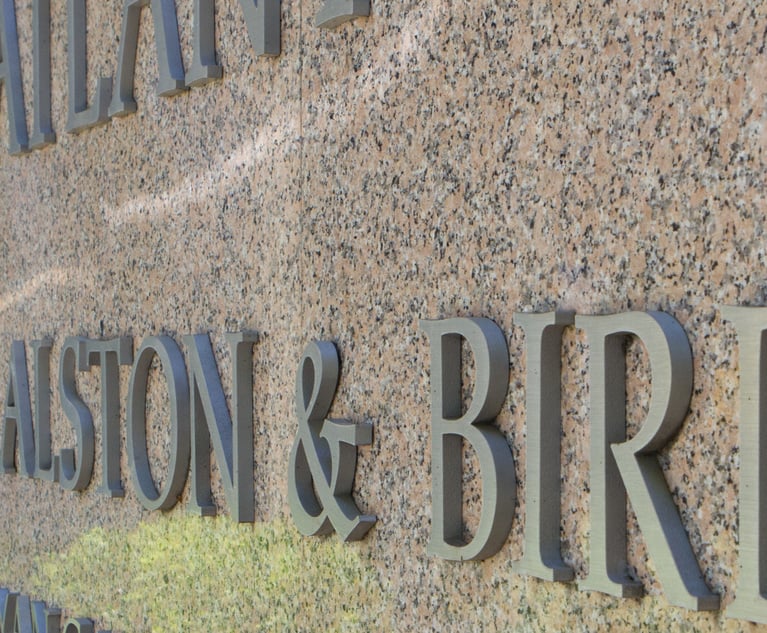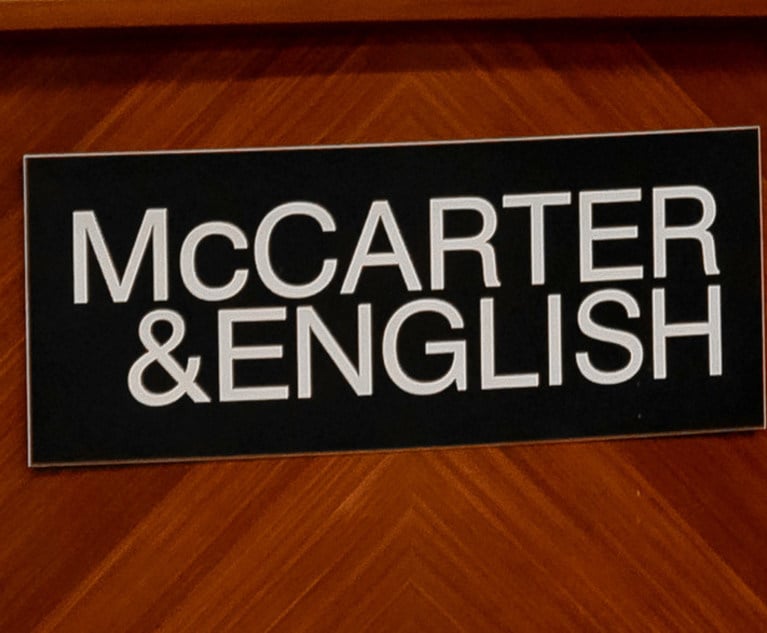 (Photo: Shutterstock.com)
(Photo: Shutterstock.com)Alternative Fees 'Finally' Gaining Currency as Biggest Firms Command a Premium
Data from LexisNexis' CounselLink e-billing platform shows that 12.2% of recent matters included a nonhourly component, compared with 9.2% in 2017.
September 23, 2019 at 09:00 AM
4 minute read
Clients are increasing their use of alternative financial arrangements, according to new data collected from LexisNexis' e-billing platform CounselLink.
The company's 2019 Enterprise Legal Management Trends Report, released Monday, looked at data aggregated from 7 million invoices and approximately 1.7 million matters. While in 2017, 9.2% of matters included a nonhourly billing component, that number rose to 12.2% in the latest period.
Kris Satkunas, director of strategic consulting for CounselLink and the author of the report, suggested that the talk that's been brewing for years about moving away from hourly billing is starting to turn to action.
"I've always heard a lot of interest and questions from general counsel: 'Tell me where other people are using AFAs, how do you suggest we could get good value?'" she said. "Those conversations have continued and we're finally at the point where people are willing to take the plunge and experiment with it more."
The CounselLink numbers also show that the percentage of dollars billed under an AFA increased from 7.4% to 8.3% from 2017 to this period.
"We're hoping that it is a true trend," Satkunas said.
The report segments the firms that use CounselLink into buckets based on size, and it found a growing gap between the actual billing rates charged by partners at large firms (with over 750 attorneys) and the next tier (those with 501 to 750 attorneys). This gap stood at 40% in 2016 and grew to 45% in 2017. Now it's at 53%.
In a related finding, the largest firms also dominated the market with regard to high-value work. They handled 74% of the billings generated by M&A transactions in the period, 58% of finance, loans and investment work, 55% of corporate, general and tax work, and 52% of regulatory and compliance work. Aggregated, the largest firms now have a 57% share of this work compared with a 50% share in 2016.
According to Satkunas, these two sets of findings suggest that the gap in rates doesn't necessarily mean that all large firms are increasing their rates, but rather that the mix of the work they are doing is trending toward the upper end. That's a reversal from several years ago when more very high-value work, including M&A, was going to firms in the second and third tiers, by size.
"That trend obviously didn't stay," she said.
But the numbers also suggest a burgeoning opportunity for these smaller firms with full-service offerings, especially if the wider U.S. economy begins to stall.
"There are opportunities for corporate counsel to lower their spending and work with smaller firms," Satkunas said. "There's an opportunity for those on the law firm side to recognize that and market themselves to take advantage of it."
One final trend in the data should give these smaller firms hoping to sell themselves to new clients some hope. The recent trend toward corporations consolidating their legal spending in a smaller number of firms hasn't reversed itself. But it shows signs of a plateau. According to the report, 61% of companies have 10 firms or fewer accounting for at least 80% of outside counsel fees, compared with 60% in 2018 and 62% in 2017.
|Read More
How Mid-Market Firms Should Pitch AFAs to Clients—Then Actually Use Them
This content has been archived. It is available through our partners, LexisNexis® and Bloomberg Law.
To view this content, please continue to their sites.
Not a Lexis Subscriber?
Subscribe Now
Not a Bloomberg Law Subscriber?
Subscribe Now
NOT FOR REPRINT
© 2024 ALM Global, LLC, All Rights Reserved. Request academic re-use from www.copyright.com. All other uses, submit a request to [email protected]. For more information visit Asset & Logo Licensing.
You Might Like
View All

Former McCarter & English Associate Fired Over 'Gangsta Rap' LinkedIn Post Sues Over Discrimination, Retaliation
6 minute read

Trending Stories
- 1The Key Moves in the Reshuffling German Legal Market as 2025 Dawns
- 2Social Media Celebrities Clash in $100M Lawsuit
- 3Federal Judge Sets 2026 Admiralty Bench Trial in Baltimore Bridge Collapse Litigation
- 4Trump Media Accuses Purchaser Rep of Extortion, Harassment After Merger
- 5Judge Slashes $2M in Punitive Damages in Sober-Living Harassment Case
Who Got The Work
Michael G. Bongiorno, Andrew Scott Dulberg and Elizabeth E. Driscoll from Wilmer Cutler Pickering Hale and Dorr have stepped in to represent Symbotic Inc., an A.I.-enabled technology platform that focuses on increasing supply chain efficiency, and other defendants in a pending shareholder derivative lawsuit. The case, filed Oct. 2 in Massachusetts District Court by the Brown Law Firm on behalf of Stephen Austen, accuses certain officers and directors of misleading investors in regard to Symbotic's potential for margin growth by failing to disclose that the company was not equipped to timely deploy its systems or manage expenses through project delays. The case, assigned to U.S. District Judge Nathaniel M. Gorton, is 1:24-cv-12522, Austen v. Cohen et al.
Who Got The Work
Edmund Polubinski and Marie Killmond of Davis Polk & Wardwell have entered appearances for data platform software development company MongoDB and other defendants in a pending shareholder derivative lawsuit. The action, filed Oct. 7 in New York Southern District Court by the Brown Law Firm, accuses the company's directors and/or officers of falsely expressing confidence in the company’s restructuring of its sales incentive plan and downplaying the severity of decreases in its upfront commitments. The case is 1:24-cv-07594, Roy v. Ittycheria et al.
Who Got The Work
Amy O. Bruchs and Kurt F. Ellison of Michael Best & Friedrich have entered appearances for Epic Systems Corp. in a pending employment discrimination lawsuit. The suit was filed Sept. 7 in Wisconsin Western District Court by Levine Eisberner LLC and Siri & Glimstad on behalf of a project manager who claims that he was wrongfully terminated after applying for a religious exemption to the defendant's COVID-19 vaccine mandate. The case, assigned to U.S. Magistrate Judge Anita Marie Boor, is 3:24-cv-00630, Secker, Nathan v. Epic Systems Corporation.
Who Got The Work
David X. Sullivan, Thomas J. Finn and Gregory A. Hall from McCarter & English have entered appearances for Sunrun Installation Services in a pending civil rights lawsuit. The complaint was filed Sept. 4 in Connecticut District Court by attorney Robert M. Berke on behalf of former employee George Edward Steins, who was arrested and charged with employing an unregistered home improvement salesperson. The complaint alleges that had Sunrun informed the Connecticut Department of Consumer Protection that the plaintiff's employment had ended in 2017 and that he no longer held Sunrun's home improvement contractor license, he would not have been hit with charges, which were dismissed in May 2024. The case, assigned to U.S. District Judge Jeffrey A. Meyer, is 3:24-cv-01423, Steins v. Sunrun, Inc. et al.
Who Got The Work
Greenberg Traurig shareholder Joshua L. Raskin has entered an appearance for boohoo.com UK Ltd. in a pending patent infringement lawsuit. The suit, filed Sept. 3 in Texas Eastern District Court by Rozier Hardt McDonough on behalf of Alto Dynamics, asserts five patents related to an online shopping platform. The case, assigned to U.S. District Judge Rodney Gilstrap, is 2:24-cv-00719, Alto Dynamics, LLC v. boohoo.com UK Limited.
Featured Firms
Law Offices of Gary Martin Hays & Associates, P.C.
(470) 294-1674
Law Offices of Mark E. Salomone
(857) 444-6468
Smith & Hassler
(713) 739-1250










